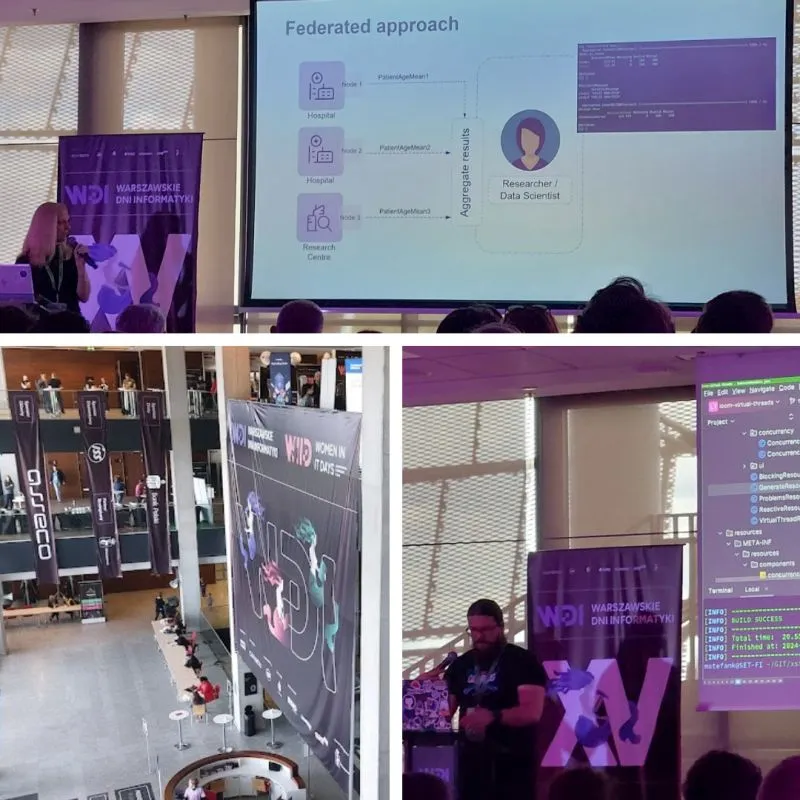Events

Warsaw IT Days 2024
IT community conference in Poland, Warsaw
About
"Warsaw Informatics Days" is a yearly event that has been happening for 15 years.
I participated in the 15th WDI.
Another edition of Warsaw Informatics Days 2024 is behind us. Certainly successful, I faced even more difficulties in choosing lecture topics from the different tracks than in the previous year! And time had to be allocated for discussions, conversations...
Moreover, there was a very high attendance, but there wasn't enough capacity in the corridors of the conference area at the National Stadium.
Kudos to the representatives at the exhibitors' booths, brave HR/IT teams :)
Out of several lectures I attended, I distinguished two. In the collage below, presentations from the DATA SCIENCE & ANALYTICS and JAVA DEVELOPMENT tracks are featured:
- "How new technologies enable what was not possible before - an example of the use of Federated Learning and Analytics in clinical trials and drug discovery."* by Paulina Kamińska
Arek:
I'm glad about the Healthcare and HIS thread. I'll add that in hospital transactional systems, there's a lot of fairly good-quality data, but strictly medical data often goes unused. It's collected for medical documentation purposes, sometimes for reporting to organizations like NFZ, but usually that's where their lifecycle ends. Surely, this is potential worth unlocking.
"Virtual threads - no pain, no gain"
Speaker: by Martin Stefank
Prelections
"How new technologies enable what was not possible before - an example of the use of Federated Learning and Analytics in clinical trials and drug discovery."
The General Data Protection Regulation (GDPR) is an European Union regulation on information privacy in the European Union and the European Economic Area. In the United States, there are equivalents in the form of a number of different regulations at the federal and state levels. While it is obvious that the right to privacy enshrined in the United Nations Universal Declaration of Human Rights must also be respected in today's digital world, not everyone realizes how this limitation affects the development of new therapeutic treatments. The limitation applies, among others, to: the possibility of reusing data from medical centers located in different regulatory zones for the purpose of verifying various research questions, e.g. related to the impact of a drug on different patient cohorts. In such a case, the traditional approach to data analysis, which involves creating a central data repository and giving data scientists access to raw patient data, is impossible to apply. But does this mean that we should give up and miss the opportunity to find a cure for a rare disease or provide less invasive anti-cancer therapy to patients? NO! Technology comes to our aid, specifically the Federated Learning and Analytics (FL/FA) approach, which enables analyzes to be performed without transferring data, while fully maintaining data security and patient privacy. FL/FA is about moving the computation to where the data resides (not the other way around). At the end we receive the analysis result or an improved model, the data is out of our sight all the time. Since data does not leave its original location, there are no regulatory restrictions. And this is a key benefit.
Prelegent: Paulina Kamińska
"Virtual threads - no pain, no gain"
Project Loom, or virtual threads, promised fast, lightweight user-space threads that are very cheap to block. While this is true, everything in life comes at a price. However, virtual threads allow users to not care about it. It is the job of the underlying libraries that all our applications use. Issues that can still occur with virtual threads, such as pinning, monopolization, or large thread-local objects, still present real-world problems many libraries still need to account for. In this session, we explain the virtual thread model execution and compare it to the event loop/reactive model utilized in Quarkus. We will also dive into individual problems that virtual threads might encounter and demonstrate how you can verify that your code doesn't run into them. By the end of the talk, you'll understand these (from the user point of view invisible) issues that often manifest only under high loads.
Others
-
Krótki kurs myślenia biznesowego dla inżynierów i inżynierek
Prelegent: Michał Bartyzel, Konsultant -
Going native with Project Panama
Prelegent: Kacper Sołtysiak, Java Developer, Sollers Consulting -
Wycieki pamięci w Javie - czyli jak głęboko jesteś w czarnej D.
Prelegent: Krzysztof Ślusarski, Senior software/performance engineer, Miim AI -
Jak rozwijać aplikację, kiedy zależności powstają równolegle w innych zespołach?
Prelegent: Daniel Trofimiuk, Principal Software Engineer, Samsung R&D Institute Poland -
Od mainframe do chmury, czyli przeniesienie potężnego systemu do obsługi kart w jednym skoku
Prelegent: Jeremi Konopka, PKO BP